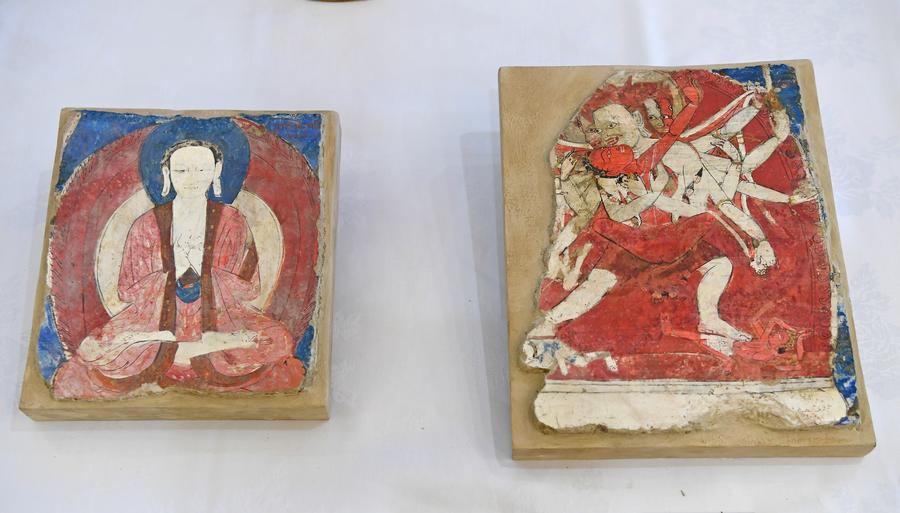
Returned Chinese cultural objects are seen at the Chinese Consulate General in New York, the United States, on April 17, 2024. (Xinhua/Li Rui)
China's relentless quest to retrieve lost cultural relics from overseas has received a significant boost, as 38 artifacts were returned by the Manhattan District Attorney's Office at a ceremony in New York on Wednesday.
The prized haul comprises mainly Tibetan Buddhist objects spanning from the Yuan Dynasty (1271-1368) to the Qing Dynasty (1644-1911).
This latest repatriation came after China had already recovered a total of 504 pieces or sets of cultural relics from the United States under a 2009 bilateral memorandum of understanding aimed at curbing the illegal imports of Chinese cultural artifacts into the United States.
According to the Chinese Society of Cultural Relics, a staggering over 10 million Chinese artifacts have been displaced overseas since the Opium War of 1840, a result of warfare and illicit trade.
The tragic loss of this hallowed cultural legacy has scarred the psyche of the ancient civilization. Yet China remains steadfast in its pursuit of restoration.
In the early years after the founding of the People's Republic of China, the government established a heritage acquisition unit that successfully repatriated national treasures like ancient calligraphic masterworks and the world's oldest surviving Chinese paper painting, "Five Oxen."
Over recent decades, China has employed a multipronged approach -- law enforcement cooperation, diplomacy, lawsuits and negotiations -- to reclaim its lost artifacts.
China has anchored these efforts by ratifying two key conventions established by UNESCO and the International Institute for the Unification of Private Law (UNIDROIT) for the return of stolen and looted cultural objects while inking bilateral deals with 26 nations to combat relic theft, illegal excavation and smuggling.
It has also cracked down on related crimes at home through multiple special operations.
These unwavering efforts, coupled with intensified global cooperation, have yielded major gains, with over 150,000 artifacts retrieved through more than 300 repatriation missions since 1949.
Yet this achievement pales before the vast trove of Chinese antiquities still scattered worldwide, underscoring the arduous road ahead.
According to experts, the 1970 UNESCO Convention and 1995 UNIDROIT Convention cannot be applied retroactively, limiting their scope to objects stolen or illegally traded after their implementation.
Further complicating matters are legal obstacles in certain importing nations and the formidable challenge of gathering evidence, with major museums also often reluctant to repatriate the artifact imports they possess.
"Cultural relics are the historical witnesses of a civilization," said Liu Weijun, a scholar in the field of cultural relic protection and professor at the People's Public Security University of China. "The historical, scientific and artistic value attached to cultural relics can only achieve its fullest significance and exert its greatest influence when the relics remain in their place of origin."
Urging greater international support for nations seeking restitution of their displaced cultural property, he said he believes that with China's persistent efforts, more artifacts will return to their rightful homeland.